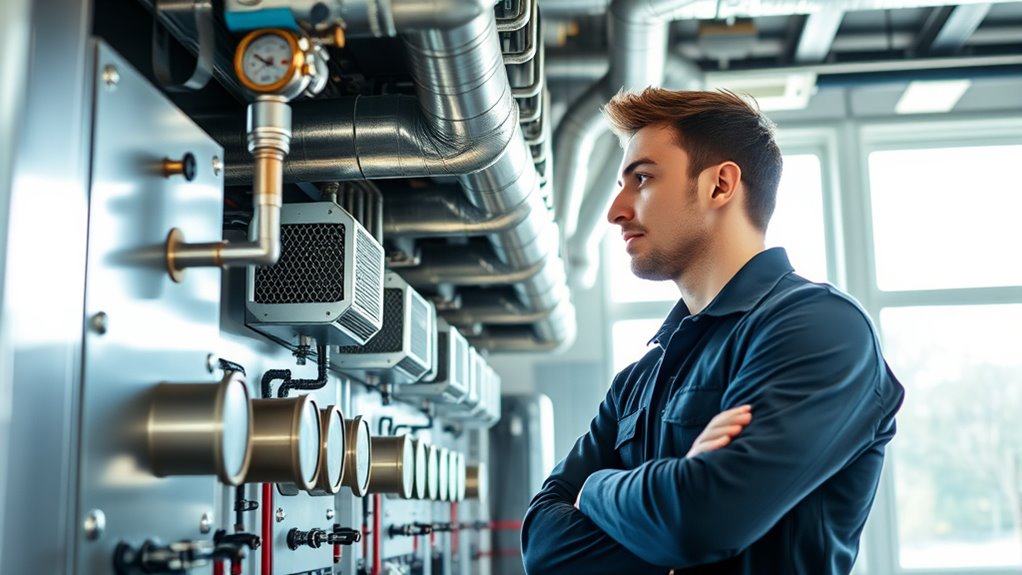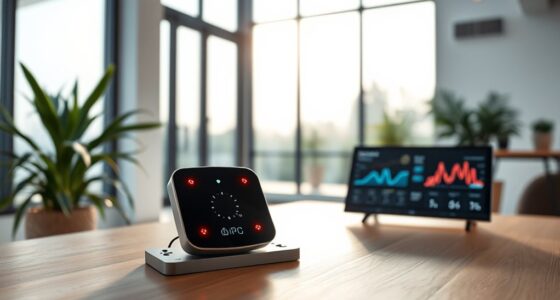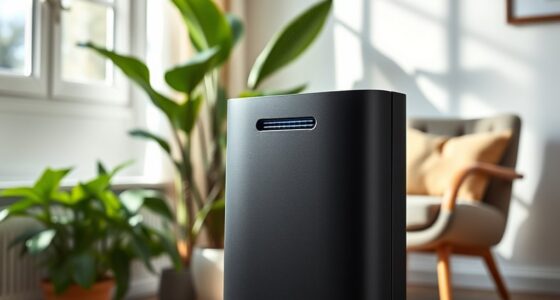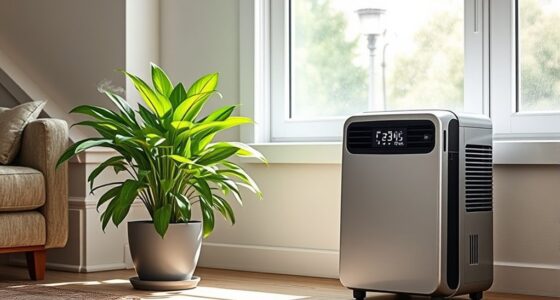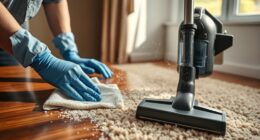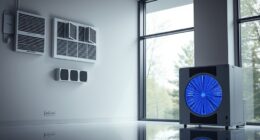Maintaining your HVAC system is key to improving indoor air quality and saving energy. Regularly changing filters, cleaning ducts, and inspecting components prevent allergens like dust and mold from building up and circulating. Proper ventilation and humidity control help reduce mold growth and keep air fresh. A well-maintained system runs more efficiently, lowers energy bills, and promotes healthier indoor environments. Keep exploring to discover how to optimize your HVAC performance further.
Key Takeaways
- Regular maintenance ensures HVAC systems effectively exchange indoor and outdoor air, improving indoor air quality.
- Changing or cleaning filters prevents allergen buildup and maintains proper airflow, enhancing air filtration.
- Duct cleaning and component inspections reduce indoor allergens and improve system efficiency.
- Proper humidity control through maintenance prevents mold growth, a major indoor allergen.
- Well-maintained HVAC systems operate more efficiently, reducing energy consumption and lowering utility costs.
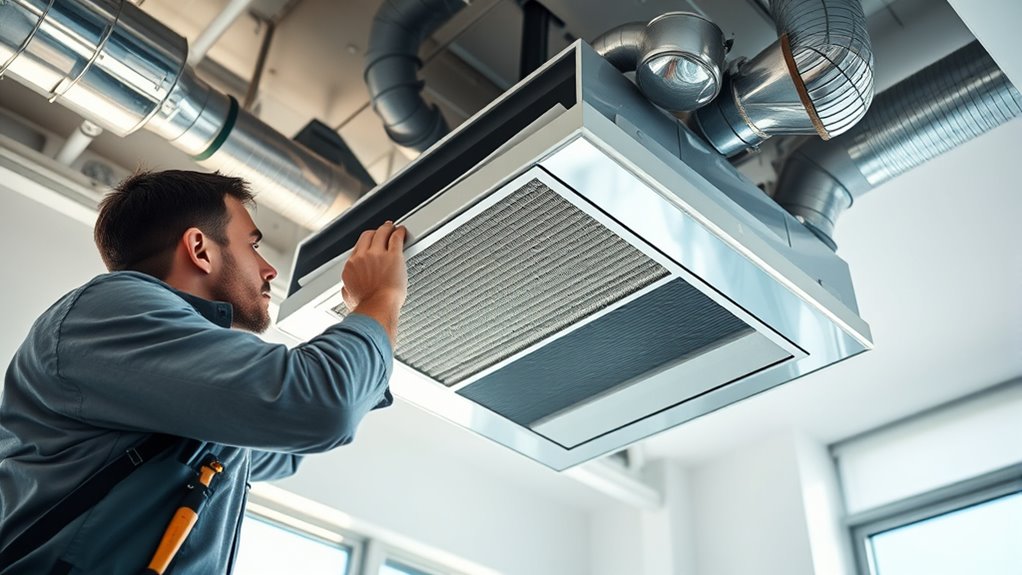
HVAC systems play a crucial role in shaping indoor air quality and energy consumption. When your system is running efficiently, it not only keeps your space comfortable but also minimizes the presence of indoor allergens that can trigger allergies or asthma. One key factor in maintaining good air quality is ensuring your ventilation systems are properly functioning. These systems are responsible for exchanging stale indoor air with fresh outdoor air, diluting indoor pollutants, and reducing the buildup of indoor allergens like dust, pollen, mold spores, and pet dander. If your ventilation system isn’t up to par, these allergens can accumulate, making your indoor environment less healthy and more uncomfortable.
Regular maintenance of your HVAC system is essential to keep ventilation systems working effectively. Changing or cleaning filters routinely is one of the most straightforward steps you can take. Dirty filters restrict airflow and allow allergens to circulate freely throughout your space. High-efficiency filters, such as HEPA filters, can trap even the tiniest indoor allergens, considerably improving air quality. Beyond filters, inspecting and cleaning vents and ductwork ensures that allergens trapped within the system aren’t redistributed into your living or working spaces. Over time, dust and debris can settle within ducts, which, if left unchecked, can become a source of indoor allergens. Keeping these components clean prevents potential health issues and ensures your ventilation system operates efficiently. Additionally, understanding air filtration standards can help you select the most effective filters for your needs.
Routine HVAC filter changes and duct cleaning prevent allergen buildup and maintain efficient ventilation.
In addition to filter changes and duct cleaning, you should schedule professional inspections periodically. Technicians can assess the overall health of your ventilation systems, identify leaks, and ensure proper airflow. Proper ventilation is essential not just for allergen control but also for controlling humidity levels, which can foster mold growth—a prominent indoor allergen. Balancing humidity through your HVAC system prevents excess moisture, reducing mold and mildew development, further enhancing indoor air quality.
Energy efficiency is closely tied to the condition of your ventilation systems. When these systems operate efficiently, your HVAC doesn’t have to work harder, which saves energy and lowers utility bills. Conversely, clogged filters or poorly maintained ducts force your system to consume more power. By keeping your ventilation systems clean and well-maintained, you improve airflow, reduce strain on your HVAC equipment, and promote energy conservation. This not only benefits your wallet but also minimizes your environmental impact.
Frequently Asked Questions
How Often Should I Replace My HVAC Filters for Optimal Air Quality?
You should replace your HVAC filters every 1 to 3 months for ideal air quality. The filter lifespan depends on factors like home size, filter type, and air circulation needs. Regular replacements ensure cleaner air, better airflow, and energy efficiency. If you have pets or allergies, consider changing filters more frequently. Keep an eye on the filter’s condition, and don’t wait too long to maintain healthy indoor air quality.
Can Regular HVAC Maintenance Reduce My Energy Bills Significantly?
Yes, regular HVAC maintenance can considerably reduce your energy bills through energy savings. When you keep your system clean and well-tuned, it operates more efficiently, using less power. This also helps minimize maintenance costs over time by preventing costly repairs. By scheduling routine check-ups, you ensure your system runs smoothly, saving you money on energy and repairs, and extending its lifespan.
What Are the Signs My HVAC System Needs Professional Servicing?
Did you know that about 75% of HVAC failures are due to neglect? If you notice airflow issues or strange system noises, it’s a sign your system needs professional servicing. Poor airflow reduces efficiency, while unusual noises often indicate mechanical problems. Addressing these signs promptly keeps your system running smoothly, improves air quality, and saves you money by preventing costly repairs. Don’t ignore these symptoms—schedule a service today!
How Do Indoor Plants Affect Air Quality in Conjunction With HVAC Systems?
Indoor plants enhance air quality through plant purification, absorbing toxins and releasing oxygen, which complements your HVAC system’s efforts. When combined with indoor biophilia, these plants boost overall air freshness and create a healthier environment. They also help maintain humidity levels and reduce airborne pollutants. You’ll notice improved air quality and a more inviting space, especially when your HVAC system works efficiently alongside your indoor greenery.
Are There Eco-Friendly Refrigerants That Improve Both Efficiency and Air Quality?
Think of refrigerant alternatives as the breath of fresh air your HVAC system needs. Eco-friendly cooling options, like hydrofluoroolefins (HFOs) and natural refrigerants like CO2 and propane, boost efficiency while reducing environmental harm. They improve air quality by minimizing harmful emissions, making your space healthier. Embracing these refrigerant alternatives is like planting a green seed for a cleaner, more sustainable future, ensuring comfort without compromise.
Conclusion
By maintaining your HVAC system, you improve your air quality and save energy. Think of it as balancing a delicate act—clean filters and efficient operation breathe fresh air into your space, while neglect leads to pollutants and higher bills. When you care for your system, you create a healthier environment, yet ignoring it risks compromise. The choice is yours: foster comfort or face the consequences of neglect. Your actions define your indoor air and energy future.
